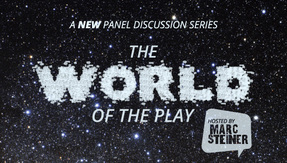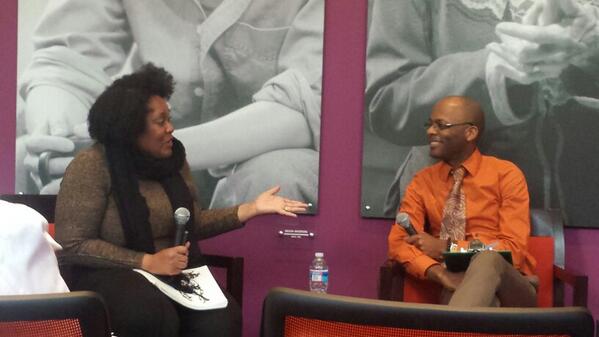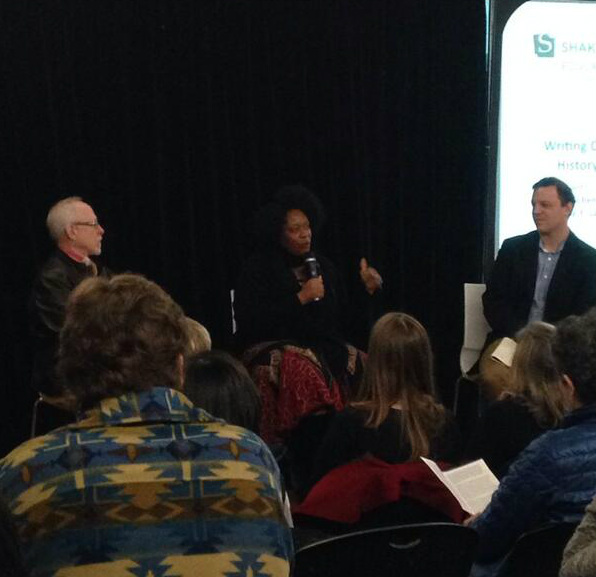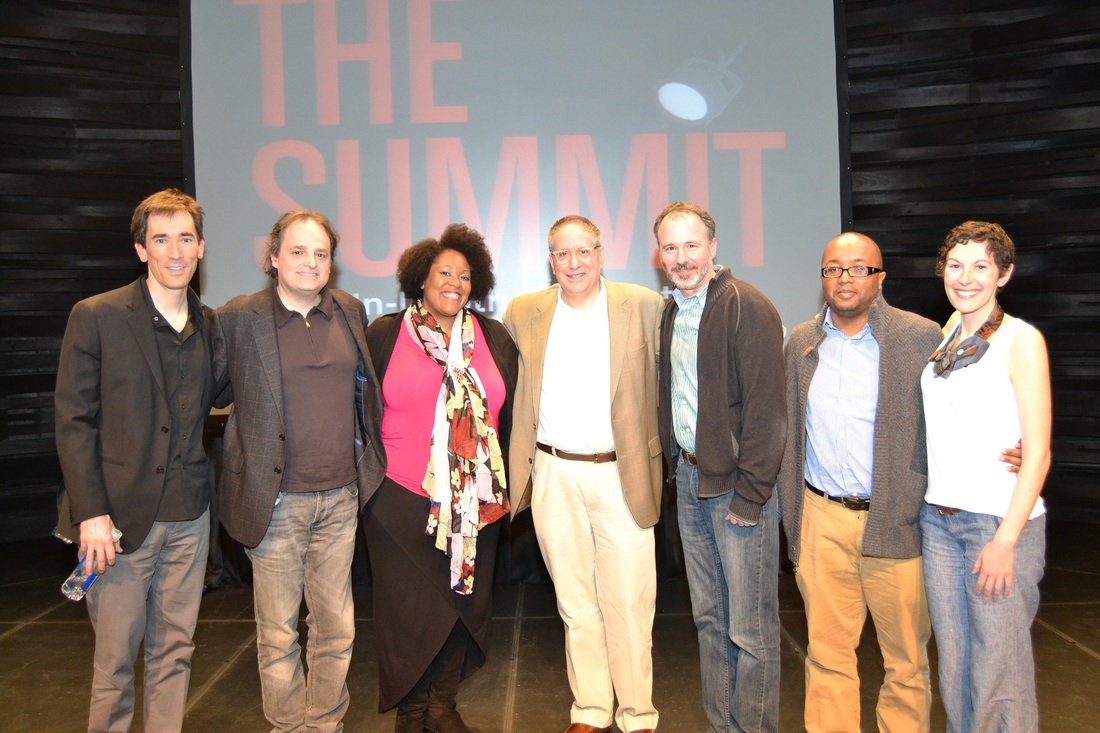 On Saturday, April 26th, Boston's StageSource presented the Defining Gender Parity Town Hall. Hosted by Julie Hennrikus and Ilana Brownstein, here are the objectives, inquiries, and themes of the Town Hall: "In this Defining Gender Parity Town Hall, we want to have a conversation about what gender parity looks like for our theater community. Where are we now, and what are our future goals? What does "success" look like, and how do we get there? The Diversity/Inclusion/Gender Parity Task Force report talked about these three topics on stage (actors), back stage (playwrights, directors, designers, technicians, stage managers, crew), in the offices (administration, front of house), in the board rooms (and donor bases), and in the audiences. Gender parity is a conversation for all of these areas, though recent conversations have been around opportunities for playwrights and directors. We will not limit the conversation, though that context is helpful when we think about how to create the change we want (need) to see. There are a number of recent conversations that help inform this meeting. They include Pat Gabridge's blog posts with an overview of some of the numbers around playwrights and directors on New England stages, and Ilana Brownstein's blog post "Rounding Up The Summit"." While wasn't able to attend in person, I watched it live and thought it was an in-depth, thoughtful, and deeply engaging discussion. I don't know how often or in how many different ways we need to keep saying this, but sexism, like racism, is a pandemic issue. Just as we have to exercise our privilege to dismantle white supremacy, we must break down the barriers of patriarchy. We must challenge pervasive assumptions that rely on the notion of race and gender based mediocrity to promote and solidify exclusionary and discriminatory practices. White is not universal; male is not inherently best. We simply cannot thrive in either/or modalities. We are stronger together than apart. You can watch the Town Hall in its entirety below: Watch live streaming video from newplay at livestream.com Race and Representation at Everyman Theatre After watching the Defining Gender Parity Town Hall, I took the train to Baltimore to participate in Everyman Theatre's World of the Play panel discussion, Race and Representation: "Our greatest accomplishment. Our greatest shame." It was a powerful, complex, and challenging conversation that asked: "What is the personal cost of being a forerunner - a barrier breaker? Through her storytelling, Lynn Nottage reminds us of those who are marginalized by circumstance, yet fervently trying to assert their presence." Moderated by Marc Steiner, I was joined on the panel by Dr. Kimberly Moffitt (Professor of American Studies) and Otis Cortez Ramsey-Zoe (Lecturer of Theatre Arts). Click here to listen to the podcast. One of the final questions had to do with hope. Marc wanted us to meditate on what issues we thought would be laid to rest in generations to come. Interestingly, and not surprisingly, no one was able to provide a solid answer. For me, in reflecting on this production of By the Way, Meet Vera Stark, I feel that many of the race and gender based socio-economic and geo-political issues that we struggled against in the 1930s, that we marched against in the 1950s, and that we balled our hands and raised our fists against in the 1970s, continue in detrimental ways to this day. And yet...I still have hope that progress, incremental though it may seem, is being made. "Writing Our History" Panel at Shakespeare Theatre Company The next morning, Sunday, April 27th, I took part in the "Writing Our History" panel, which was part of Shakespeare Theatre Company's AsidesLIVE symposium around Henry IV, Parts 1 and 2, which Shakespeare wrote approximately 200 years after the historical events depicted. Moderated by STC's Literary Associate and Production Dramaturg, Drew Lichtenberg, I was joined on the panel by Robert Schenkkan, Pulitzer Prize winning playwright of Broadway's All the Way. "What is the history play," Lichtenberg ask. "People often throw those words about with complete confidence in the fixity of the genre, but when you look closer, 'the history play' becomes a surprisingly amorphous and constantly evolving term of art. I'm eager and excited to hold up models of the history play, both Shakespearean and contemporary, as we attempt to answer this surprisingly complicated and resonant question." Many of the issues I wrestled with during the Race and Representation panel bubbled under this conversation. Weeks later, this question that Drew asked resonates with me still, "What is the ethical obligation of contemporary theatre artists in representing history?" For me, the greatest obligation we have is to tell the stories of our communities, especially those who are marginalized and to speak truth to power. The greatest thing the Shakespeare Theatre Company (and perhaps even the Folger Theatre) can do is to commission writers of color to tell our stories and to adapt the classics for audiences today. This way, these new plays will be one day be the classics that theatres and historians 400 years from now will produce and study for a greater understanding of the generation that not only brought forth the greatest advancement of technology ever known to man, but also set us on the path to eradicating the ills of racism and sexism in this country. The Summit Part Three: Directors and Playwrights at Arena Stage By the time Monday rolled around, I was amped and ready. It was then that I took part in the long awaited and much anticipated final installment of The Summit hosted by Arena Stage and moderated by Washington Post theatre critic Peter Marks. The focus of the evening was on playwrights and directors. I was joined by Rachel Grossman, ringleader of the District’s innovative audience participation troupe, dog & pony dc; David Muse, Studio Theatre artistic director and director of Tribes; frequent Woolly Mammoth director/playwright Robert O’Hara (Antebellum and Bootycandy); Ari Roth, Theater J artistic director and author of last season’s Andy in the Shadows; and D.C.-area playwrights and members of Arena Stage’s inaugural Playwrights’ Arena collaborative writing group Norman Allen (Nijinsky's Last Dance). A few days ahead of the event, Peter emailed each of us and shared: "If you've been following along, you'll know the Summits have been lively, entertaining and even a bit provocative. As you're an especially brainy group, I'm going to try to make the questions friendly but challenging, and of course relevant to the issues facing playwrights, directors and artistic directors today. I think it would be helpful if you all think about the "meta" question of what role theater wants to function going forward in this society. Statistics indicate that a shrinking share of Americans opts for theatergoing as even a once-in-a-while experience. There are also those questions of who the theater you all so diligently strive to put on is for--and whether the playwriting and directorial opportunities are being shared equitably with, for instance, women and people of color." The event was live streamed and so I'm going to let you all experience this event for yourself. After the Summit, I wrote to Peter to thank him for including me and shared my thoughts on why I felt events like this were important:
"With this series, you've given leaders of the D.C. Theatre Community an opportunity to address issues that concern theatre artists locally, regionally, and nationally. From Gender Parity and Diversity and Inclusion to marketing and capitalization to the complex Artist and Arts Organization relationship and the unfortunately reality of our ever dwindling audiences, you are challenging each of us--theatre practitioners and audience member alike--to dig deep, engage, and find new and lasting ways to grow, nurture, and sustain the American Theatre."
0 Comments
Your comment will be posted after it is approved.
Leave a Reply. |
My BlogI'm a playwright, dramaturg, and teaching artist. It is here where you'll find my queries and musings on life, theater and the world. My posts advocate for diversity, inclusion, and equity in the American Theatre and updates on my own work. Please enjoy!
Categories
All
Archives
June 2020
Reading List
|



